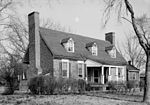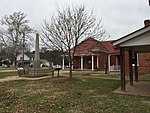Ruthville, Virginia
Charles City County, Virginia geography stubsUnincorporated communities in Charles City County, VirginiaUnincorporated communities in VirginiaUse mdy dates from July 2023

Ruthville is an unincorporated community in Charles City County, Virginia, United States. The community was the central point of the county's free African American population for many years, even before the Civil War (1861–1865). Following Emancipation, the crossroads community included the Mercantile Cooperative Company and Ruthville Training School. The United Sorghum Growers Club also met here. Earlier known by several other names, the name "Ruthville" recalls local resident Ruth Brown. Her name was selected when the Post Office was established there in 1880.
Excerpt from the Wikipedia article Ruthville, Virginia (License: CC BY-SA 3.0, Authors, Images).Ruthville, Virginia
Ruthville Road,
Geographical coordinates (GPS) Address Nearby Places Show on map
Geographical coordinates (GPS)
| Latitude | Longitude |
|---|---|
| N 37.3675 ° | E -77.041111111111 ° |
Address
Ruthville Road 8798
23147
Virginia, United States
Open on Google Maps







